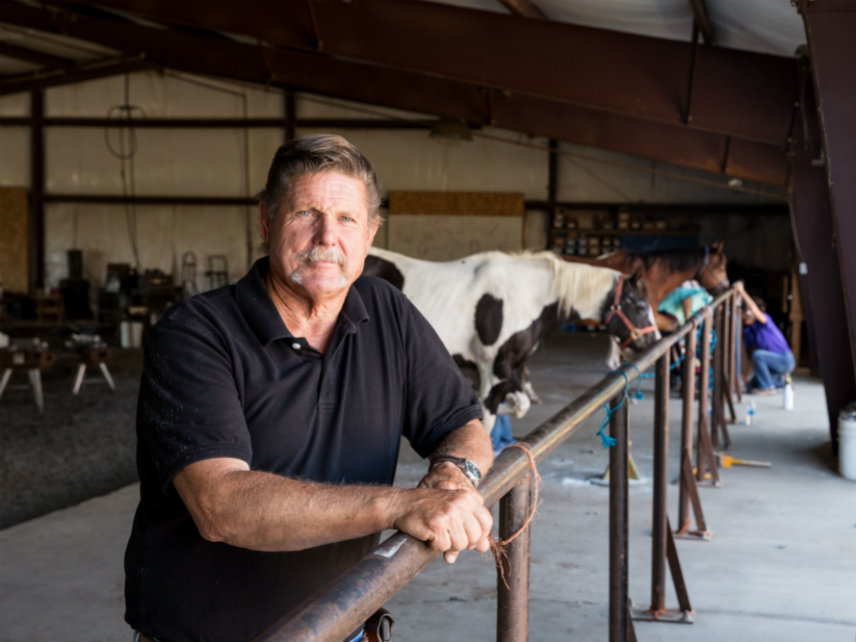Absurd State Law Mandates High School Diploma to Put Shoes on Horses
"You don't have to know algebra to shoe a horse," says member of the International Horseshoeing Hall of Fame. California officials disagree.

There's nothing in the curriculum of California high schools—or any other high schools, for that matter—regarding the centuries-old practice of making horseshoes and putting them on horses.
That's why Bob Smith, owner of the Pacific Coast Horsehoeing School, used to train students to be farriers—the technical term for someone who makes and fits horseshoes—regardless of how much formal schooling they had. It's a good-paying job, one that comes with flexibility and independence. There are no licensing laws restricting who can be a farrier or mandating a certain level of training. If you can find someone to teach you the skill and find someone to pay you to practice it, you're all set.
At least that's what Smith thought, until the California Bureau for Private and Postsecondary Education sent him a letter last year. During an inspection of Smith's records, bureau officials discovered that he had been teaching students who lacked a high school diploma or GED certificate.
The letter informed him by a 2010 state law Smith could face fines or have his school shut down by the state if he accepted students who lacked a high school education.
"You don't have to know algebra to shoe a horse," Smith says. "You don't have to know how to read a novel to shoe a horse. Horses don't do math and horses don't speak English."
For that matter, the practice of making horseshoes and shoeing horses has been around a whole lot longer than the idea of secondary education. It's even been around longer than the First Amendment, which Smith says the state of California is violating by threatening to stop him from teaching certain students. With the help of the Institute for Justice, a libertarian law firm, Smith is suing the state in federal court.
"Just like publishing a how-to book or uploading an instructional video to YouTube is protected by the First Amendment, so is teaching," said Keith Diggs, an attorney for IJ, in a statement. "By limiting who Bob is allowed to teach and what Esteban is allowed to learn, California has not only harmed the students most in need of an education, but also violated their First Amendment rights."
The California Department of Commerce and the Bureau for Private and Postsecondary Education, the two defendants in the case, did not return calls seeking comment Tuesday.
Under that 2010 state law, students entering a private trade or vocational school must have a high school diploma or GED. The law was part of an effort to crack down on colleges and other postsecondary schools that functioned like "diploma mills," handing out bogus credentials to underqualified students while charging them high prices and offering the promise of high-paying jobs.
A similar federal law applies only to schools that accept student loans—passed as a way to curb supposed abuses of the student loan system by for-profit colleges and trade schools—but the California law applies to all postsecondary schools. Even those, like Smith's horseshoeing school, that do not accept student loans.
Smith's school is hardly a diploma mill. He's forgotten more about horseshoeing than any bureaucrat in Sacramento. He's been running his school since 1974, and has trained more than 2,000 graduates. In 2010, he was inducted into the International Horseshoeing Hall of Fame—a real thing that really exists!
Smith is not the only one hurt by this absurd law.
Becoming a trained farrier can provide a nice living for people without much formal schooling. People like Esteban Narez, who applied to Smith's school earlier this year. Raised by a single mother, Narez attended public school through his freshman year of high school, when he injured himself playing football and was forced to take time off from school to recover. He never went back. Now, at age 26, he's too old to do so under California law.
Narez has worked a variety of jobs but discovered a passion for working with horses while doing part-time work at Monterey Bay Horsemanship & Therapeutic Center. There, he met a trained farrier who suggested he take classes from Smith.
Smith rejected Narez' application because lacked a high school diploma. Narez is now a co-plantiff in Smith's lawsuit .
Had Smith accepted Narez he could have faced criminal "infractions" carrying fines of up to $5,000, $500 less than Smith's charge for eight-week course. Infractions in California law do not carry jail penalties, but in addition to the criminal violation, Smith could potentially face injunctions, have his school placed into receivership, or have it shutdown by the state.
And for what purpose? The law punishes people like Narez who have failed to obtain an arbitrary and ultimately unnecessary level of formal education before deciding to become a farrier. Why not require a college degree, one might wonder, or tell potential trade school applicants that they have to come back with a master's degree. Ridiculous, yes, but no less so than California's requirement.
"For students with limited education, this law is this biggest obstacle to their success," says Smith. "This law dictates that someone with limited formal education is not allowed to invest in themselves."


Show Comments (48)